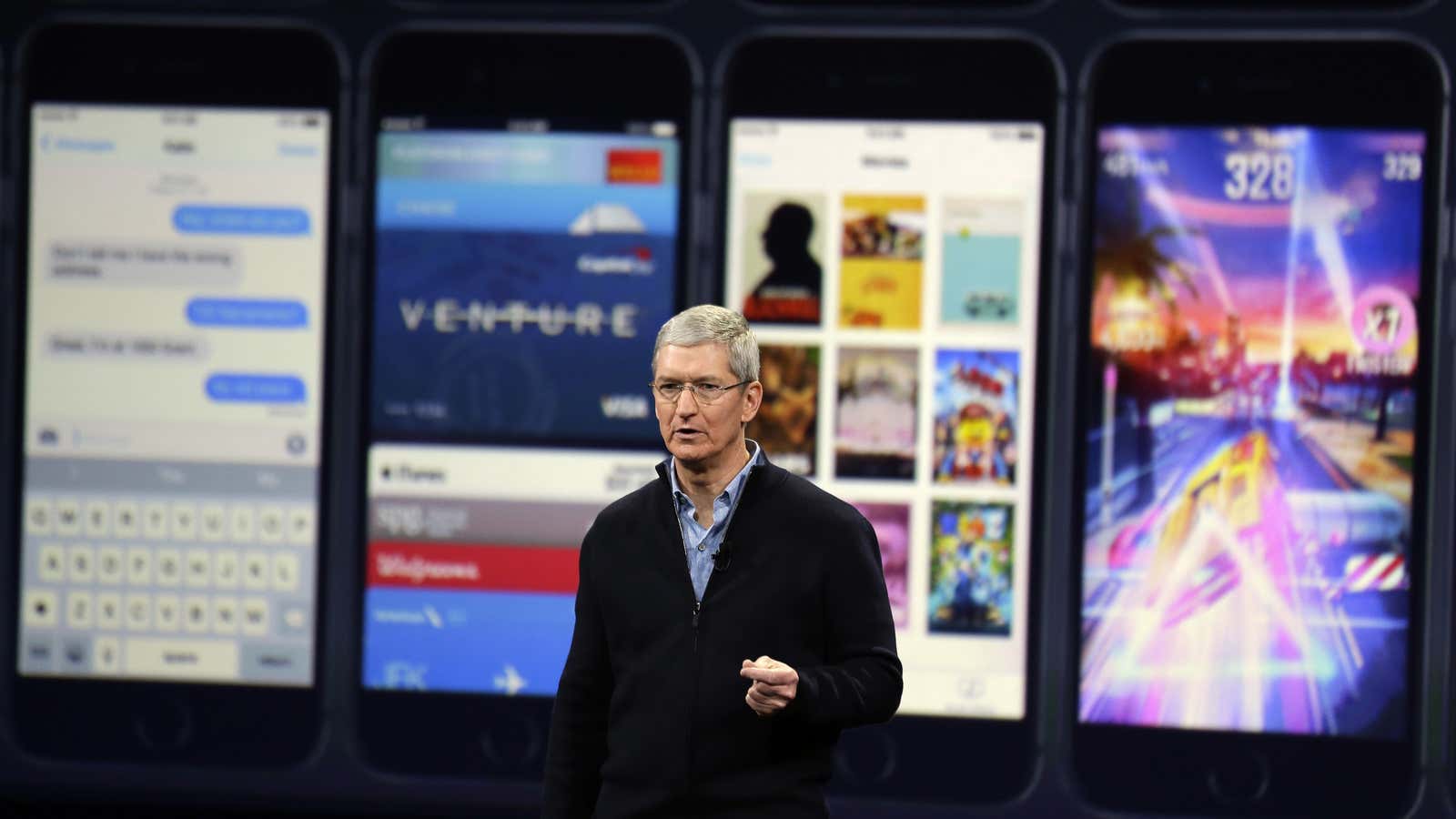Apple just reported its first-quarter earnings results, and although sales of iPhones, iPads, and Macs were either flat or lower than the same quarter last year, there was one bright spot in the company’s revenue: its services business.
According to a footnote in Apple’s breakdown of its quarterly revenue, its “Services” bracket incorporates ”Internet Services, AppleCare, Apple Pay, licensing and other services.” While Apple’s services business only accounts for about $7 billion of the roughly $75 billion revenue figure for the quarter, the business line has doubled since Apple first started reporting it at the end of 2011. It likely also includes sales of films, TV shows and music from iTunes, Apple Music streaming subscriptions, and apps sold through the App Store.
Apple said on its earnings call that over 1 billion Apple devices—phones, watches, computers, and Apple TVs—have engaged with one of the company’s services over the last 90 days. So, although Apple isn’t selling more phones, it’s still getting more value out of each phone sale. As CEO Tim Cook said on the call:
“A growing portion of our revenue is directly driven by our existing install base. Because our customers are very satisfied and engaged, they spend a lot of time on their devices and purchase apps, content, and other services. They also are very likely to buy other Apple products or replace the one that they own.”
Some of the services Apple currently offers leave a lot to be desired. Apple Music, which many users are forgetting to cancel after signing up for a free three-month trial, is still working out some bugs. And although the newest version of Apple TV was generally well-received by critics, it’s not offering a complete replacement to cable TV, especially if you’re a fan of live sports. Apple Pay—which reports suggest the company receives 15 cents per $100 spent through the contactless payment system—generally works well, but isn’t widely accepted, and has only launched in the US, UK, Canada, and Australia so far.
So what other services can Apple offer to keep users locked in to its ecosystem, even when they don’t feel compelled to upgrade their phones? There’s a pretty long list of things it could offer those with an Apple personal cloud.
Here are a few ideas:
More cloud. As the cameras continue to get better on the iPhone, users will need increasingly more iCloud space to store all their photos.
Wireless services. To keep all those devices connected to Apple services, it could look into creating its own wireless network. There were rumblings of Apple launching a mobile network last summer, and while it seems those reports were false, it’d be a great way to drive some additional revenue (as Google Fi may or may not be doing for Alphabet) and keep people streaming Apple Music and downloading apps, wherever they are.
Proper TV. Apple has enough spare cash to buy HBO and its cable-network parent Time Warner, which would help it kickstart a TV streaming setup that people might actually want to buy in large numbers. But it probably won’t.
Home security. Apple launched an Internet-of-Things control system called HomeKit in 2014, but it hasn’t built any products or services specifically for it yet. Why not turn your unused iSight cameras into a home security system? Apple could create a paid-for service where users can check up on their houses while they’re out, right from their iPhones.
VR content. On today’s call, Cook said that he thinks virtual reality is “really cool.” Apple hired a leading VR researcher last week, according to Fast Company. If the company is thinking about putting out a VR headset, every service it provides now—from apps, to films, to games—could be replicated for VR.
Siri Pro. Apple is also acquiring artificial-intelligence talent, most likely to bolster the capabilities of its often-unhelpful virtual assistant, Siri. If Apple is working on an AI system that could be useful to business—think Facebook M or x.ai, but for any request—it could market a more powerful version of Siri for a monthly fee.
Car services. Apple is likely working on some sort of car, so why not build out an On-Star-style assistant service to use in the Apple Car? It could even use Siri Pro.
